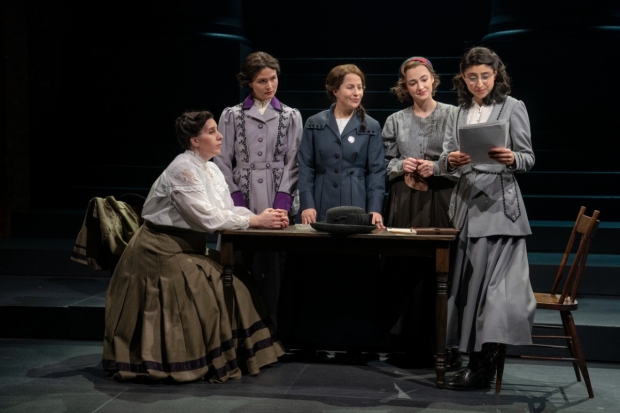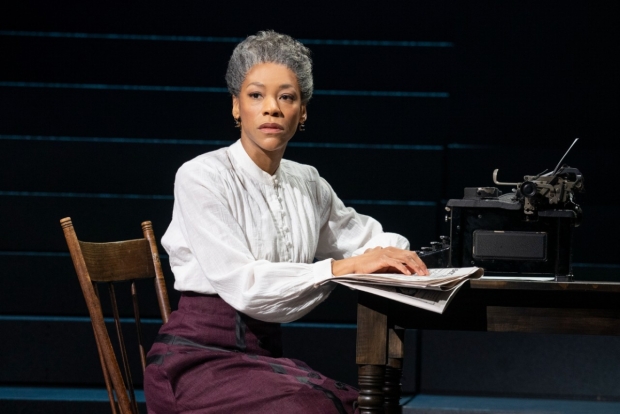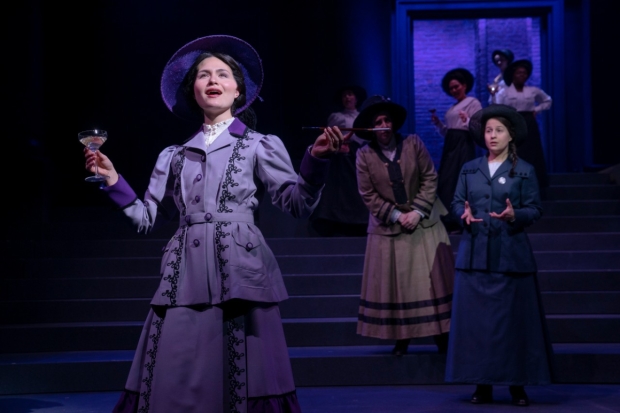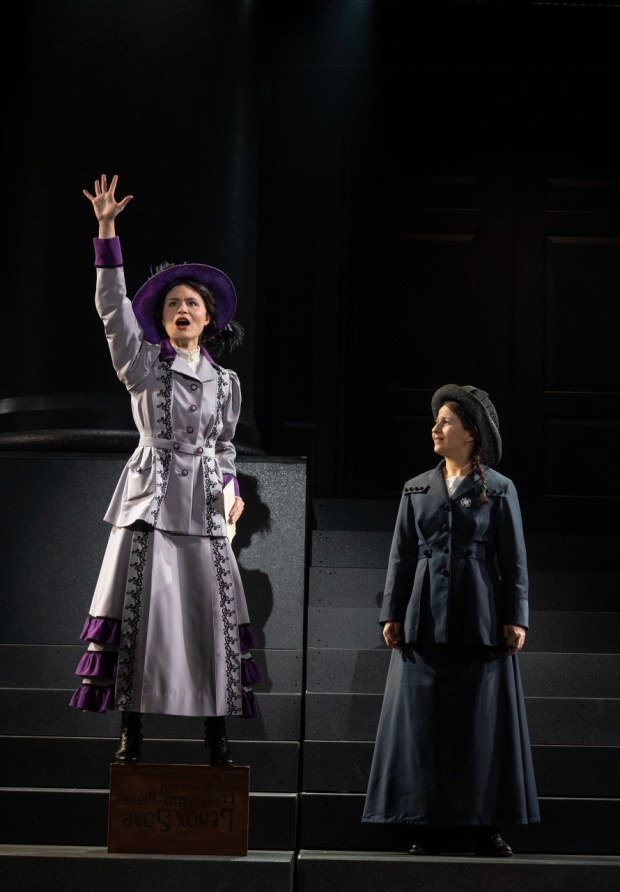Review: Suffs Shows How Both a Movement and a Musical Can Get Bogged Down
Shaina Taub writes and stars in her new historic musical about Alice Paul and the women’s suffrage movement.

(© Joan Marcus)
Suffs is not the female Hamilton. There are certainly positive implications embedded in such buzzy chatter, and rumblings in that vein have successfully built anticipation for the arrival at the Public Theater of Shaina Taub's new historical musical about the passing of the 19th Amendment. It feels in keeping with the suffragist spirit, however, to start this reflection by heading off those irritating impulses — the ones that labeled Booksmart "the female Superbad" or Bridesmaids "the female Hangover." Suffs, with all its flaws — and there are many in this world-premiere production — does not need the support of a male property to stand on its own two feet. If anything, it's too grounded for its own good.
Suffs opens with a delicious whiff of no-boy's-allowed impertinence as its all femme-identifying cast (and band) performs the vaudevillian opening number "Watch Out for the Suffragette!" Costumed by Toni-Leslie James in jaunty men's formalwear (and choreographed by Raja Feather Kelly), this throng of drag performers trade snappy barbs about those shrewish women fighting for the vote ("She's planning to scold you for three hours straight / Get out now before it's too late!"). Leigh Silverman directs this sequence with a playful antagonism — just the Brechtian ticket for a modern musical about the trials of first-wave feminism.
But style and substance end up separating like oil and water throughout the rest of the show. Taub's unique theatrical point of view resurfaces sporadically like gusts of bolstering winds (the wonderful Grace McLean gets to enjoy much of it as an equivocating, Chaplinesque Woodrow Wilson) — but then Taub pulls down the sails to return to the nuts and bolts of an interesting but plodding story.

(© Joan Marcus)
The musical takes us through the events that unfolded between 1913 and the 1920 ratification of the 19th Amendment, with trailblazing suffragist Alice Paul (played by Taub) at the dramatic center. Paul is the face of the impatient and brazen new guard of activists, clashing with the more hospitable old guard represented by Carrie Chapman Catt (a stately Jenn Colella bringing her signature bright voice to the role). Catt, president of the National American Woman Suffrage Association, or NAWSA, advocates for women's suffrage on a state-by-state basis through appeasement and relationship building, while Paul, a 27-year-old PhD, would rather force the issue with a Constitutional amendment won through political pressure and protest.
Paul sets up a headquarters in Washington, DC, rallies a group of young allies, and gets to work on a national campaign, beginning with the first-ever protest march in the nation's capital and climaxing with a hunger strike for jailed suffragists (the diminutive term "suffragette" is officially retired). She stoically breaks through barrier after barrier, chanting refrains of "We've got to find a way" and "I'll be the one to finish the fight" — mantras that have the sound of emboldening battle cries, but that often land with a disappointing plink. Perhaps because Paul, despite her corporeal presence onstage, still feels like a two-dimensional name in a history book.
Taub, through both her writing and performance, gives Paul a tireless drive, steadfast fortitude, and unflinching sense of duty. Rarely, however, do we see her extrapolate what nuances might underlie this anomalous persona. We get just a passing reference to the early death of her father, which she says pushed her to be "the strong one" for her mother. She confesses this intimate detail to one of her sisters in arms, Inez Milholland (Phillipa Soo) — a reviving moment that puts into stark relief just how few human relationships have been built onstage thus far.

(© Joan Marcus)
Soo brings life to most scenes she's in as Milholland, Taub's best-developed character. A brash labor lawyer with sexual confidence and a talent for public speaking, Milholland will surely be Suffs' breakout historical icon, due in no small part to Soo's magnetic performance (Mimi Lien's set design feels largely static but does offer a suitable runway for Milholland's historic horseback march on Washington).
Excellent performers fill out the rest of the supporting cast, but they often feel more like points in a think piece than history come to life. Nikki M. James, as journalist and civil rights activist Ida B. Wells, exposes the complications of intersectional feminism after being told that a Black presence at the 1913 suffrage parade would be offensive to the movement's southern belles. Her indictments of white feminism in the ambling song "Wait My Turn" are pointed and astute, but they build no lasting tension within the plot — just as the playful duet, "If We Were Married," between Doris Stevens (Nadia Dandashi) and Dudley Malone (Tsilala Brock), offers a convenient opportunity to list the rights women lose in matrimony but does not forge a convincing bond between the pair of future spouses.
The score's most successful numbers are the climactic protest songs that come at the end of each act: The shouts of "we won't wait another day" and "the young are at the gates," linking the suffragists of yore to the activists of today. These moments finally get your heart racing, just as Taub (an activist in her own right) has long proved capable of doing through her insightful and cathartic music. If only Suffs weren't as splintered as the movement.

(© Joan Marcus)











